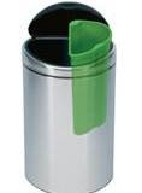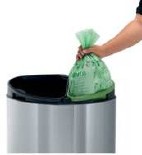KBzine: the original kitchen and bathroom industry e-news - since 2002
28th January 2021
We strongly recommend viewing KBzine full size in your web browser. Click our masthead above to visit our website version.
Composting the clean and easy way with Brabantia's new biodegradable bin liners

Keep waste bins clean and dry with Brabantia's 100% biodegradable and compostable bin liners - specially designed for all organic kitchen waste and now available in three convenient sizes - 10lt, 12lt, 18lt.
Vegetable peelings, mouldy fruit and used coffee grounds all go to produce great compost, but also make a dirty, soggy mess at the bottom of your food waste bin. Yet with these bin liners you can help keep your bins clean, dry and manageable - while also doing your bit for the environment.
Now available in three capacities and sized-to-fit a range of its smaller and recycling kitchen bins, these bin liners will help home and business owners to conveniently store and then carry their organic waste straight from the kitchen to the green or food waste collection bin, all without the messy performance of emptying it first.
Made from strong 100% natural starch-based material from renewable crops, the bags can be disposed of along with their contents. They are certified biodegradable and compostable to the highest European standard for compostable packaging, EN 13432 and can be used in local authority green or waste food collection bins where plastic bags are prohibited.
The new bin liners are designed to fit Brabantia's kitchen unit bins, the 10 litre Built-in bin (code C) and Built-in Separator bin (code Q), as well as its 12 litre Pedal bin (code C) and Twin bin 10 litre bio-basket (code K). It's easy to choose the right size liner for your bin simply by matching the special colour code on the replacement bin liner to the one inside the Brabantia bin. This also ensures they are easy to change and avoids having an unsightly overlap.
Top tips for food waste recycling
It is estimated that we throw away around £50 a month per household on food that we could have eaten. Consider how to reduce your food waste with ideas such as meal planning, storing food correctly, making use of leftovers in other meals, and understanding date labels. See www.lovefoodhatewaste.com for more information.
If you have the space outside to compost, do so. It's easy to start, even with the smallest outside space.
If you don't have outside space for composting at home, check with your local authority what can be recycled, and how. Some councils offer a separate collection for food or garden waste. Why not check to see what options are available in your area?
Once you know what foods can be composted or recycled, plan your organic and waste food storage and make sure everyone in your household understands what can be composted, recycled or re-used.
Check your collection dates. Many local authorities collect different items on different days, so keep a note of what days your green and/or food waste is collected (often weekly), while paper, glass, plastics and bottles are usually collected for recycling fortnightly. To help you remember, mark the dates on a calendar, and note advised changes for public holidays.
Useful information can be found at:
www.wrap.org.uk / www.organics-recycling.org.uk / www.recyclenow.com/compost
T: 0845 602 4877
5th November 2010








